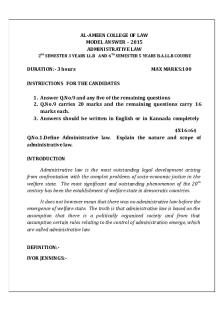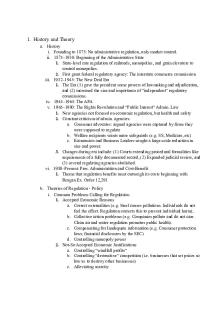1- intro to administrative law and jurisdicitonal fact etc PDF

| Title | 1- intro to administrative law and jurisdicitonal fact etc |
|---|---|
| Author | E M |
| Course | Administrative Law |
| Institution | University of Western Australia |
| Pages | 7 |
| File Size | 132.3 KB |
| File Type | |
| Total Downloads | 42 |
| Total Views | 124 |
Summary
1- intro to administrative law and jurisdicitonal fact etc...
Description
1- UNIT OVERVIEW AND INTRO BACKGROUND Hugh Finn ([email protected]) – email to arrange appointment. Emma Garlett James Bordi Recommended text: Government Accountability: Australian Administrative Law CLASS TIMES
Monday: 10am-12pm
Tuesday: 12-2pm, 2-4pm
Tuesday: online 5-7pm
ASSESSMENTS 1. Problem based Assignment
Assessment Information Sheet (Blackboard)
legal memorandum
content covered in Teaching Weeks 1-3
2. Tutorial Reflection
Assessment Information Sheet (Blackboard)
critical reflection
written and oral submissions – merits review hearing
3. Final examination
online IRIS-invigilated exam
Academic Integrity Conditions document
Restricted Book – notes in a folder
Trimester 2 Examination Period
ADMINISTRATIVE DECISION-MAKING AND ADMINISTRATIVE LAW ADMINISTRATIVE DECISION-MAKING Making of laws (legislating) Administering of laws (executive action) -
Exercise of a statutory power is often referred to as ‘administrative action’ Refers to members of the executive branch who exercise the power - administrators – and the function of those persons in administering statuses.
Examples of decision-making:
Courts Tribunals Ministers Cabinet Government department CEOs Administrative offivers within Government departments.
CHARACTERISTICS OF A ‘DECISION’ -
An order, ruling, determination, judgement, etc Must be made by a decision-maker Involves an exercise of power Affects rights, liabilities or interests of a person
Criminal Appeals Act 2004 (WA) s 6: defines decision. Not every administrative decision is subject to judicial review. Administrative action which does not affect an individual’s liberties, vested rights or legitimate expectations is not subject to judicial review. Similarly, policy decisions of government are not subject to judicial review. EXAMPLES OF QUESTIONS THAT MAY ARISE: (NOT FRAMEWORK) 1. a decision-maker does (ie decides)
did the decision-maker have the power to make the decision?
2. after some sort of process of assessment
2
did the decision-maker afford procedural fairness?
did the decision-maker consider all mandatory relevant considerations? did they consider irrelevant considerations?
3. which adversely affects the interests of a person
does the person have standing?
4. for which a statute (or the common law) gives the person an entitlement to reconsideration, review or appeal of that decision
on what basis can the person seek R/R/A of the decision?
what entity will undertake R/R/A of the decision?
MERITS REVIEW The process by which a person or body: i. ii. iii.
other than the primary decision-maker; reconsiders the facts, law and policy aspects of the original decision; and determines what is the correct and preferable decision.
Judicial review is focused on defective nature of original decision, while merit review makes new decision. Merits review may affirm or deviate from original decision. Aims: 1. ensure administrative decisions are correct & preferable: a. correct - in the sense that they are made according to law b. preferable - in the sense that, if there is a range of decisions that are correct in law, the decision settled upon is the best that could have been made on the basis of the relevant facts 2. ensure fair treatment of persons affected by a decision 3. improve the quality and consistency of the decisions of primary decision-makers 4. enhance the openness and accountability of decisions made by government EXAMPLE OF MERITS REVIEW: The AAT can review a wise range of decision made by government ministers, departments and agencies under Commonwealth laws. Centrelink. Child Support, Citizenship, Freedom of information (FOI), Migration and refugee, National Disability Insurance Scheme (NDIS), Security assessments (ASIO), Taxation and commercial.
JUDICIAL REVIEW
3
= executive action is prevented from exceeding the powers and function assigned to the executive by law and the interests of the individual are protected accordingly. – Brennan J in Scientology v Woodward 1982. APPEAL: -
an application to a higher court to reconsider the decision of a lower court, on the ground that there has been an error in the decision of the lower court a right of appeal may be created, limited, or abolished by statute exists as a statutory remedy rather than as something actionable at common law
WHAT IS ADMINISTRATIVE LAW Administrative law is the body of public law that regulates government executive power(‘control of government action’), The specific focus of this course is: How far can the exercise of power by the executive be challenged? Possibilities: merits review or judicial review Accountability mechanisms: freedom of info, public investigatory bodies STATE OR FEDERAL EXERCISE OF POWER Federal:
Administrative Appeals Tribunal Act 1975 (Cth)
Administrative Decisions (Judicial Review) Act 1977 (Cth) – Federal Court
Freedom of Information Act 1982 (Cth)
Ombudsman Act 1976 (Cth)
State Administrative Tribunal Act 2004 (WA)
Freedom of Information Act 1992 (WA)
Parliamentary Commissioner Act WA (1971)
common law judicial review – Supreme Court of Western Australia
State:
Common Abbreviations AAT
Administrative Appeals Tribunal (federal)
ADJR
Administrative Decisions (Judicial Review) Act
ARC
Administrative Review Council
4
SAT
State Administrative Tribunal (WA)
FOI
Freedom of Information
AAR
Administrative Appeal Reports
ALD
Administrative Law Decisions
CONSTITUTIONAL FRAMEWORK Rule of Law: Responsible Government Separation of Powers
Separation of Legislative, Executive, Judicial Power – federal
Ch III – institutional integrity of State courts invested with federal jurisdiction
Checks and balances
In reality, not a strict separation (legislative and executive in particular)
Courts: Judicial Review - was the decision lawful?
Tribunals: Merits Review – decision could be legally correct, but wrong on the ‘merits’ (eg decision maker makes mistaken finding of fact)
BODIES OF THE EXECUTIVE
5
The Crown
Cabinet
Executive Council
Ministers
Government Departments
Public Servants
Tribunals, boards and commissions
Statutory bodies (local governments, QANGOs/GBEs – Government Business Enterprises): https://www.bbc.com/news/uk-politics-11405840
Statutory Offices
REVIEW BY COURTS
at Common Law - need to establish: 1.
standing
2.
a ground of review
3.
a remedy
under statute (eg ADJR) [codified]
courts review LEGALITY, not MERITS
COMMON LAW REMEDIES
Prohibition: to prevent a tribunal from exceeding its jurisdiction
Certiorari: quashes a decision made in excess of jurisdiction
Mandamus: order to perform a public legal duty
Declaration: order as to state of affairs eg that x is an Australian citizen
Injunction: order to prevent or compel the doing of something
EXAMPLES OF ARGUMENTS
The purported decision maker did not have the power to make the decision…because…
The decision maker made the decision for a wrong/improper purpose…because…
The decision maker took into account irrelevant considerations…because…
The decision maker failed to take into account relevant considerations…because…
The decision was unreasonable…because…
There was no evidence justifying the decision…because…
The affected person was not allowed a hearing before the decision was made… because…
The decision maker was biased…because…
MERITS REVIEW BODIES
6
Ombudsman Special Tribunals
External merits review eg AAT, SAT
Why distinguish nature of powers?
Boilermakers doctrine
only legislative instruments must be tabled in Parliament
sub-delegation allowed if an administrative power
AAT and ADJR confined to decisions of an ‘administrative character’
DIFFERENCE BETWEEN LEGISLATIVE & ADMINISTRATIVE/ EXECUTIVE POWERS: Commonwealth v Grunseit (1943) 67 CLR 58
reg 8 of Cth Regulations empowered the Minister for Army to make a direction that any male refugee alien less then 60 years old who has not joined the military forces, shall perform such service as the Minister for the Interior directs
Minister for Army made such a declaration
Issue: was that declaration ‘legislative’ or ‘executive/administrative’?
If legislative, it needed to be tabled in each House of Cth Parliament pursuant to s 48 Acts Interpretation Act to be valid
If executive, not so required
High Court held: was executive The general distinction between legislation and the execution of legislation is that legislation determines the content of a law as a rule of conduct or a declaration as to power, right or duty, whereas executive authority applies the law in particular cases
7...
Similar Free PDFs

Week 1 Intro to Law
- 4 Pages

Administrative Law - Admin Law
- 6 Pages

Administrative Law Wk 1 outline
- 6 Pages

Administrative Law - Lecture notes 1
- 48 Pages

Intro to Law Notes - Weeks 1 -10
- 23 Pages

Dicussion 2.2 intro to law
- 1 Pages

Administrative Law Outline
- 33 Pages

Administrative Law - Essay
- 5 Pages

Administrative law (4th)
- 59 Pages

Administrative Law Outline / Summary
- 46 Pages

Administrative LAW MERITS REVIEW
- 38 Pages

Administrative Law Outline
- 14 Pages

Administrative Law 70617 - Essay
- 14 Pages
Popular Institutions
- Tinajero National High School - Annex
- Politeknik Caltex Riau
- Yokohama City University
- SGT University
- University of Al-Qadisiyah
- Divine Word College of Vigan
- Techniek College Rotterdam
- Universidade de Santiago
- Universiti Teknologi MARA Cawangan Johor Kampus Pasir Gudang
- Poltekkes Kemenkes Yogyakarta
- Baguio City National High School
- Colegio san marcos
- preparatoria uno
- Centro de Bachillerato Tecnológico Industrial y de Servicios No. 107
- Dalian Maritime University
- Quang Trung Secondary School
- Colegio Tecnológico en Informática
- Corporación Regional de Educación Superior
- Grupo CEDVA
- Dar Al Uloom University
- Centro de Estudios Preuniversitarios de la Universidad Nacional de Ingeniería
- 上智大学
- Aakash International School, Nuna Majara
- San Felipe Neri Catholic School
- Kang Chiao International School - New Taipei City
- Misamis Occidental National High School
- Institución Educativa Escuela Normal Juan Ladrilleros
- Kolehiyo ng Pantukan
- Batanes State College
- Instituto Continental
- Sekolah Menengah Kejuruan Kesehatan Kaltara (Tarakan)
- Colegio de La Inmaculada Concepcion - Cebu


